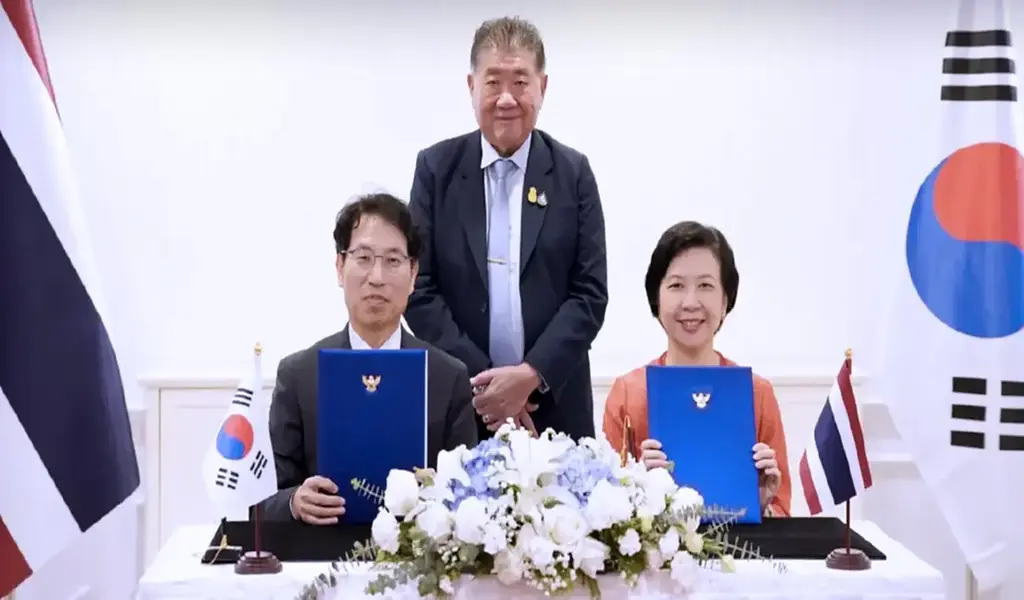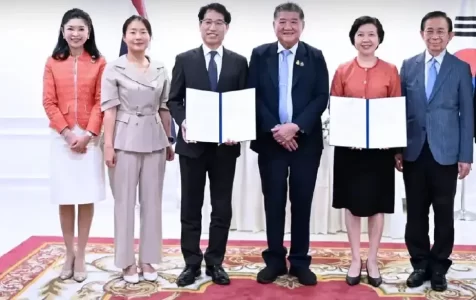(CTN News) – Thailand and South Korea are negotiating an economic partnership agreement (EPA) to pave the way for a free trade agreement between the two nations by late 2025 or early 2026, Commerce Minister Phumtham Wechayachai announced on Thursday (March 28).
He expressed confidence that the bilateral free trade agreement (FTA) would increase Thailand’s global competitiveness while attracting greater investment from South Korea in industries such as electric car manufacturing and information technology.
Thailand and South Korea Aim for Free Trade Agreement by 2026
“The Republic of Korea refers to this agreement with their trading partners as an EPA, but it is actually an FTA,” said Phumtham, who is also the deputy prime minister.
He noted that the trade agreement with South Korea will build on the kingdom’s existing multilateral trade agreements with the East Asian country, including the Asean-Korea Free Trade Agreement (AKFTA) and the Regional Comprehensive Economic Partnership (RCEP).
In addition to better competitiveness for Thailand and higher investment from South Korea, the trade minister hoped that the FTA will promote greater cooperation between the two nations in sectors such as supply chain and digital economy.
Phumtham was speaking to reporters following a signing ceremony for EPA negotiations, which was attended by Chotima Iemsawasdikul, director-general of the Ministry of Commerce’s Department of Trade Negotiations, and Roh Keon-ki, deputy minister for trade negotiations from South Korea’s Ministry of Trade, Industry and Energy.
“This marks the official start of discussions for a free trade agreement between Thailand and South Korea. Both sides expect the first round of negotiations to begin in the middle of 2024 and to conclude by the end of 2025 or early 2026,” Phumtham said.
He said that this was the Srettha government’s first FTA negotiations with a foreign country as part of its policy of growing global markets and attracting more foreign investment via FTAs.
Thai products that are expected to benefit from an FTA with Korea include meat and fishery products (such as frozen and processed chicken meat and frozen and processed seafood), tropical fruits (such as mangoes, guava, and mangosteen), other food products (such as flour, sauces, and condiments), wood products (such as processed lumber, particleboard, and plywood), and chemical products, according to the commerce minister.
He expects more Thai service industries to enter the South Korean market, such as transportation, warehousing, hotels, and restaurants.
According to Phumtham, the South Korean ministry identified Thailand as one of the targeted countries with significant potential for bilateral EPAs.
“[South] Korea has invested tens of billions of baht in our country, including Samsung electrical appliances, KIA automobiles, and electronic devices. “We appreciate their interest in expanding the market here,” Phumtham stated.
Last year, South Korea was Thailand’s 12th largest trading partner, worth $14.7 billion (536 billion baht).
Thai exports to South Korea were $6 billion and included refined oil, rubber products, sugar, electrical circuit boards, and aluminum products.
Last year, Thailand imported $8.6 billion in products from South Korea, which included iron and steel, electrical circuit boards, chemicals, and machinery and components.
Thailand and South Korea agreed through the EPA to push for negotiations in areas of mutual interest, such as economic cooperation, digital, and government procurement, as well as to achieve a high level of market access to goods and services, according to the Korea Economic Daily.
The South Korean government expects the South Korea-Thailand EPA to increase bilateral trade in automobiles, electric vehicles, and car parts; create opportunities in construction, manufacturing, and visual and auditory service markets; strengthen economic cooperation in supply chains, bio, and clean economy; and foster forward-thinking strategic trade relations between the two countries, according to the report.
According to Roh, the agreement will open up new commercial prospects in the Asean area, facilitating the spread of Korean culture and fostering closer cooperation in critical fields such as supply chain, biotechnology, and clean economy.
According to South Korean media, the two countries have completed all necessary formalities for initiating the negotiations and intend to have the first official round of talks soon, once prior consultations progress in the first half of this year.







